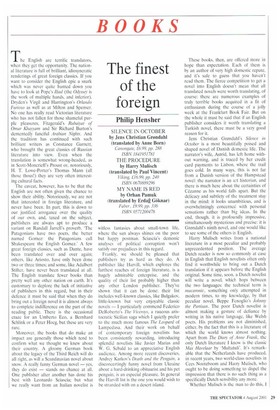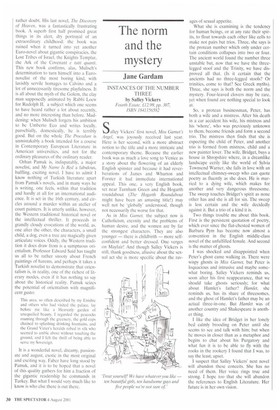The finest of the foreign
Philip Hensher
SILENCE IN OCTOBER by Jens Christian Grundahl (translated by Anne Born) Canon gate, £6.99, pp. 288 ISBN 1841951781 THE PROCEDURE by Harry Mulisch (translated by Paul Vincent) Viking, £16.99, pp. 240 ISBN 0670889296 MY NAME IS RED by Orhan Pamuk (translated by Erdak Goknar) Faber, .19.99, pp. 336 ISBN 0571200478 The English are terrific translators, when they get the opportunity. The national literature is full of brilliant, idiosyncratic renderings of great foreign classics. If you want to consider the English epic a snark which was never quite hunted down you have to look at Pope's Iliad (the Odyssey is the work of multiple hands, and inferior), Dryden's Virgil and Harrington's Orlando Furioso as well as at Milton and Spenser. No one has really read Victorian literature who has not fallen for those shameful purple pleasures, Fitzgerald's Rubaiyat of Omar Khayyam and Sir Richard Burton's dementedly fanciful Arabian Nights. And the tradition has continued with such brilliant writers as Constance Garnett, who brought the great classics of Russian literature into view. Even when the translation is somewhat wrong-headed, as in Scott-Moncrieffs Proust or, notoriously, H. T. Lowe-Porter's Thomas Mann (all those thous!) they are very often interesting cultural facts.
The caveat, however, has to be that the English are not often given the chance to show their ability. Notoriously, we are not that interested in foreign literature, and never have been. In part, this is down to our justified arrogance over the quality of our own, and, taxed on the subject, publishers are always apt to produce a variant on Randall Jarrell's proverb, 'The Patagonians have two poets, the better named Gomez: the Patagonians call Shakespeare the English Gomez,' A few great foreign classics, such as Dante, have been translated over and over again; others, like Ariosto. have only been done two or three times; and some, like Adalbert Stifter, have never been translated at all. The English translate fewer books than pretty well any other nation on earth. It's customary to deplore the lack of initiative of publishers in this regard, but in their defence it must be said that when they do bring out a foreign novel it is almost always to complete indifference on the part of the reading public. There is the occasional craze for an Umberto Eco, a Bernhard Schlink or a Peter Hoeg, but these are very rare.
Moreover, the books that do make an impact are generally those which tend to confirm what we thought we knew about their country. A gloomy German book about the legacy of the Third Reich will do all right, as will a Scandinavian novel about snow. A really funny German novel — yes, they do exist — stands no chance at all. One publisher after another has done his best with Leonardo Sciascia; but what we really want from an Italian novelist is witless fantasies about small-town life, where the sun always shines on the poor but happy postman. Sciascia's demonic analyses of political corruption won't satisfy our prejudices in this regard.
Frankly, we should be pleased that publishers try as hard as they do. A publisher like Harvill, which explores the furthest reaches of foreign literature, is a hugely admirable enterprise, and the quality of their list probably higher than any other London publisher. They've shown that it can be done: their list includes well-known classics, like Bulgakov, little-known but very enjoyable classic novels — I particularly commend Federico DeRoberto's The Viceroys, a raucous aristocratic Sicilian saga which I quietly prefer to the much more famous The Leopard of Lampedusa. And their work on behalf of contemporary foreign novelists has been consistently rewarding, introducing splendid novelists like Javier Marias and W. G. Sebald to an appreciative English audience. Among more recent discoveries, Andrey Karkov's Death and the Penguin, a disconcertingly funny novel from Ukraine about a hard-drinking obituarist and his pet penguin, is an especial pleasure. In general the Harvill list is the one you would wish to be stranded with on a desert island.
These books, then, are offered more in hope than expectation. Each of them is by an author of very high domestic repute, and it's safe to guess that you haven't read them. The fierce competition to get a novel into English doesn't mean that all translated novels were worth translating, of course: there are numerous examples of truly terrible books acquired in a fit of enthusiasm during the course of a jolly week at the Frankfurt Book Fair, But on the whole it must be said that if an English publisher considers it worth translating a Turkish novel, there must be a very good reason for it.
Jens Christian Grondahl's Silence in October is a most beautifully poised and shaped novel of Danish domestic life. The narrator's wife, Astrid, has left home without warning, and is traced by her credit card payments to Lisbon, where the trail goes cold. In many ways, this is not far from a Danish version of the Hampstead novel: the narrator is an art historian, and there is much here about the certainties of Cezanne as his world falls apart. But the delicacy and subtlety of the treatment stay in the mind; it looks unambitious, and is overwhelmingly concerned with personal sensations rather than big ideas. In the end, though, it is profoundly impressive, simultaneously mysterious and precise: it is Grondahl's ninth novel, and one would like to see some of the others in English.
Harry Mulisch writes from a national literature in a most peculiar and probably unprecedented position. The average Dutch reader is now so commonly at ease in English that English novelists often only find it worthwhile to bring out a Dutch translation if it appears before the English original, Some time, soon, a Dutch novelist will write a novel, which hops between the two languages: the technical term is macaronic, something only attempted in modern times, to my knowledge, by that peculiar novel, Beppe Fenoglio's Johnny the Partisan. The poor Dutch novelist is almost making a gesture of defiance by writing in his native language, like Welsh poets. His problems are not diminished, either, by the fact that this is a literature of which the world knows almost nothing. Apart from The Diary of Anne Frank, the only Dutch literature I know is the classic Max Havelaar by 'Multattili'. It's remarkable that the Netherlands have produced, in recent years, two world-class novelists in Cees Nooteboom and Harry Mulisch, who ought to be doing something to dispel the impression that there is no such thing as a specifically Dutch sensibility any more.
Whether Mulisch is the man to do this, I rather doubt. His last novel, The Discovery of Heaven, was a fantastically frustrating book. A superb first half promised great things in its alert, dry portrayal of an extraordinary childhood: the book was ruined when it turned into yet another Euro-novel about gigantic conspiracies, the Lost Tribes of Israel, the Knights Templar, the Ark of the Covenant e tutu i quanti. This new book confirms, alas, Mulisch's determination to turn himself into a Euronovelist of the most boring kind, with lavishly servile homages to Calvin° and a lot of unnecessarily tiresome playfulness. It is all about the myth of the Golem, the clay man supposedly animated by Rabbi I.oew for Rudolph II, a subject which one seems to have heard rather a lot about recently, and no more interesting than before. Maddening: when Mulisch forgets his ambition to be Umberto Eco and writes locally, parochially, domestically, he is terribly good. But on the whole The Procedure is unmistakably a book intended for a course in Contemporary European Literature in American universities, and not for the ordinary pleasures of the ordinary reader.
Orhan Pamuk is, indisputably, a major novelist, and My Name Is Red a fabulous, baffling, exciting novel. I have to admit I know nothing of Turkish literature apart from Pamuk's novels, and in many ways he is writing, one feels, within that tradition and hardly at all for an international audience. It is set in the 16th century, and circles around a murder within an atelier of court painters. It is utterly unlike, however, the Western traditional historical novel or the intellectual thriller. It proceeds in grandly cloudy evocations of the world, as, one after the other, the characters, a small child, a dog, even a tree are magically given articulate voices. Oddly, the Western tradition it does draw from is a sumptuous orientalism. Professor Edward Said has taught us all to be rather snooty about French paintings of harems, and perhaps it takes a Turkish novelist to demonstrate that orientalism is, in reality, one of the richest of literary modes, even if it has nothing to say about the historical reality. Pamuk seizes the potential of orientalism with magnificent gusto:
This area, so often described by my Enishtc and others who had visited the palace, lay before me like a Heavenly garden of unequalled beauty. I regarded the peacocks roaming through the greenery, the gold cups chained to splashing drinking fountains, and the Grand Vizier's heralds rolled in silk who seemed to amble about without touching the ground, and I felt the thrill of being able to serve my Sovereign.
It is a wonderful novel, dreamy, passionate and august, exotic in the most original and exciting way. Faber have long stood by Pamuk, and it is to be hoped that a novel of this quality gathers for him a fraction of the gigantic readership he commands in Turkey. But what I would very much like to know is who else there is out there.



























































 Previous page
Previous page